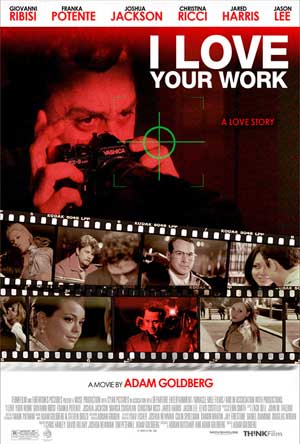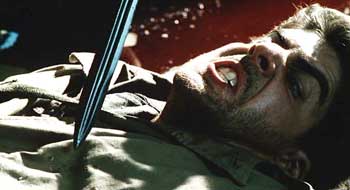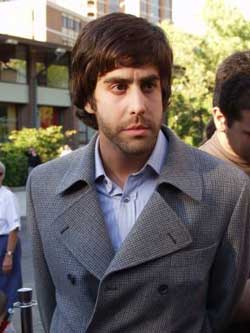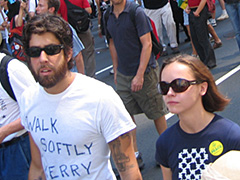 When I met Adam Goldberg I was surprised at how buff he is. It just wasn’t something I expected. I met him at the offices of ThinkFilm, the company distributing his new film, I Love Your Work. It’s a dark film about a movie star – Giovanni Ribisi – who is in the middle of a mental breakdown, and who begins stalking one of his own fans. It’s got a great cast that includes Christina Ricci, Vince Vaughn, Jason Lee and Franka Potente.
When I met Adam Goldberg I was surprised at how buff he is. It just wasn’t something I expected. I met him at the offices of ThinkFilm, the company distributing his new film, I Love Your Work. It’s a dark film about a movie star – Giovanni Ribisi – who is in the middle of a mental breakdown, and who begins stalking one of his own fans. It’s got a great cast that includes Christina Ricci, Vince Vaughn, Jason Lee and Franka Potente.
Goldberg was tired. He was still living on Los Angeles time, and in the middle of the interview he had to stop to pop two Excedrin and a vitamin (these are the pills I get to see Hollywood stars taking? The good old days are long gone indeed). While Goldberg was tired, he was excited to talk about the new film, especially after having a great Q&A session after a screening of it the night before. Not everybody received the film quite so well, though, as I would soon find out as he let me in on what it’s like to receive some truly scathing reviews.
But first, we started with living on Los Angeles time.
Q: Do you like living in LA?
Goldberg: It’s where I’m from, and I find myself moving back there every time after living here, so I guess I do.
Q: You just seem to have a very New York attitude.
Goldberg: That’s what I’m told. I think it was too many viewings of Mean Streets when I was a child. Or I was switched at birth. But I think that’s why I keep going back to Los Angeles – there’s enough New York in me. It’s like chicken with chicken sauce.
Q: I was giving away tickets to Saw II on the site recently. It’s sort of violence porn, so the question I asked people to answer was, ‘What’s the most memorable cinematic kill?’ It didn’t win get the most votes, but a ton of people wrote in your death in Saving Private Ryan.
Goldberg: Oh, that’s nice. I guess.
Q: That’s the question. Is it nice? And is it something you’re still getting recognized for the most?
Goldberg: No, it seems to be whatever the last thing I did was. A lot of people say The Hebrew Hammer, which is funny because relatively few people saw that. But no, the Saving Private Ryan death scene just came up last night. Some girl came up to me. I think it’s being aired on television a lot, because it’s been coming up lately.
Strangely, I remember this from the time, there was nothing written about it. Which I found not so much offensive, but confusing in a way. There was obviously a lot written about the opening battle sequence and the closing battle sequence, but then it was the only intimate sort of kill in the movie. I always thought that was kind of odd. But then the people I would meet over the years would be very troubled by it. Which I took as a compliment – well, I don’t know as a compliment, but I’m proud of that scene. I enjoyed, if you can call it that, doing that scene.
 Q: Have you been killed a lot in films? I can’t think of that many.
Q: Have you been killed a lot in films? I can’t think of that many.
Goldberg: I was killed in that. I was undead but killed in The Prophecy. I was actually killed in Higher Learning. I was killed in an episode of NYPD Blue. I was killed in something else I did – this movie Stay Alive, apparently I didn’t make it.
Q: Is that the new Mike Binder movie?
Goldberg: No, it’s this horror film.
Q: It’s the one where people die from playing video games.
Golberg: It is. With all the young kids.
Q: Frankie Muniz is in that.
Goldberg: Sure he is.
Q: Does he get knocked off?
Goldberg: I don’t know.
Q: You’re a guy who dies playing video games?
Goldberg: Yeah. I’m not famous enough to be the Drew Barrymore of the movie, but essentially if you were to compare it to Scream that’s how it works. I don’t know how it translates to minutes but I’m in the first twelve pages. So yes, I have been killed and or beaten up a bunch.
Q: Do you die well in Stay Alive?
Goldberg: It’s one of those things where they cut after the camera swoops in on me and I’m sprawled out on the desk the next day with the blood and everything.
Q: So let’s talk about the film you’re here to promote. What was the genesis of it? It’s such a weird idea, to have a star stalking a fan.
Goldberg: I literally had the idea for that in just a minute one day a long time ago. It was rooted in the fact that I was getting this really boring fan mail for this television show I was doing. Again, it’s just based in the fact that whatever it is you’re doing at the time is what people will respond to, but for some reason if you’re doing television you’re going to get a certain amount of fan mail. And they’re form letters, basically. These people, all they do is watch television and they see somebody and they wait until the credits come on and they write the name down and send a form letter.
Q: They want an autograph?
Goldberg: Exactly. They want an autographed card or head shot or something. I remember getting one of these and I was living in Culver City. The return address was somewhere on the west side and I thought it would be funny if I hand delivered this to the guy. Then I started talking to the other actors on the show, saying wouldn’t it be a funny concept if a star stalked a fan. Which I thought would be a kind of a great sort of genre type movie, but I don’t have inclination or the wherewithal to write that kind of conventional genre movie, so I didn’t really think much of it for a lot of years.
Then every four or so years, and it happened recently, I find myself writing and writing and writing, and needing to make a movie. I was kind of trying to pillage my well in there and figure out what it was going to be. I had just moved to New York, actually, and one day I remember feeling very overwhelmed by the throngs of people, the sea of people I was wading through on my way to Bed, Bath & Beyond. I honestly don’t know if it was something that happened that day in regards to somebody mentioning my name, but it became evident to me that if you were a super famous person who was already pre-disposed to a certain degree of paranoia or self-consciousness or self loathing and then were thrust into the limelight and then thrust into a situation where you had every reason to be paranoid, that would be interesting. So it took off from there.
happened that day in regards to somebody mentioning my name, but it became evident to me that if you were a super famous person who was already pre-disposed to a certain degree of paranoia or self-consciousness or self loathing and then were thrust into the limelight and then thrust into a situation where you had every reason to be paranoid, that would be interesting. So it took off from there.
Then I wanted to make it more emotionally rounded instead of psychological conceits. Then it grew from there.
Q: The structure is interesting. A lot of the important parts are told in flashback, and Giovanni’s character is kind of established in flashback, since in the present parts we only see him after he has begun a downward spiral. How did you decide to structure it in that way?
Goldberg: It seems to me to be just the way I write. My first movie was non-linear, I guess is what they say. I can’t seem to write in any other way. I can give you explanations for it which seem to me to be pretty basically boiled down to that is how I believe life is truly experienced. I don’t experience it as this linear thing; we’re always lost in thought, not paying attention to what people said. We have these really active dream lives with constitute a majority of our consciousness. That sort of thing. I think also the stuff that I’ve written so far has been about being unable to live in the present tense, and coveting or romanticizing a better past.
It’s interesting because my first film didn’t – well, there are a lot of reasons for it, but basically you can’t find it. It’s funny because I started to notice not too long after that it became a very popular way – I suppose Reservoir Dogs did that too – it became a popular structure. I’m not entirely sure why people are doing it. It is effective, I think, sometimes. But it doesn’t seem to always be married to the thematic stuff, it just looks cool.
Q: It’s interesting because now audiences accept it. Once upon a time that stuff was over the top of the audience’s heads.
Goldberg: They can sometimes. But people seem to get very pissed about this movie.
Q: Why?
Goldberg: I say people, but it’s a cross section of people I hear about from the people representing this movie and in particular these reviews that I got in the trades that I can sort of laugh about now but it took me a good year and a half to shake off because they were so aggressive.
I think there are a lot of explanations for it. People had preconceptions about the movie and it didn’t fulfill those preconceptions. I’m sort of implicitly accused of being a dilettante. And the inability to admit that, like it or hate it, it was something that was worked on and has some irrefutable earmarks of at least well intentioned filmmaking. [laughs] I think a lot of it was about being an actor, but my sense in particular is that people didn’t understand it, and that pisses people off and is taken as an aggressive move by the filmmaker. I don’t think it’s that – it’s not Lost Highway. It seems very simple to me, actually, and upon two viewings it’s like ‘Oh yeah.’ It’s challenging in that it might need to draw you in more than what you’re used to. Not everybody wants to do that, I guess.
Q: When you say that it doesn’t meet expectations that’s interesting, because with this cast and with you, there’s the thought that this could be a funny picture, and it’s not. There’s funny stuff in it, but it’s not a funny picture. Is that something you’re worried about audiences understanding when they walk in?
Goldberg: We discussed this. For instance, the poster goes so far in the other direction making it look like some kind of Hitchcock movie. So did the trailer. I tend to think we overcompensated in that regard a little bit. But I think enough stuff got out there that people will know.
Mark Urman of ThinkFilm [the distributor], when he saw it at Toronto – I don’t know why, because it clearly stated what the movie was about, but I guess some people don’t read [the notes] or whatever, and he was dealing with Hebrew Hammer acquisition stuff for Canada – he was totally thrown. And he’s a guy who’s way into these kinds of movies.
 Q: When I go see films I don’t usually read the notes, because I don’t want to know what to go in expecting. But I think expecting something funny almost helped because it made the unsettling bits more unsettling.
Q: When I go see films I don’t usually read the notes, because I don’t want to know what to go in expecting. But I think expecting something funny almost helped because it made the unsettling bits more unsettling.
Goldberg: If I read the LA Times review before seeing the movie – and I can’t remember exactly what it said, but it was like ‘If you watch these three movies back to back, eat some Thai food and had an argument with your girlfriend and went to sleep you would dream this movie.’ Which I thought was kind of brilliant and I couldn’t believe the Times wrote that. But if I read that, my expectations would be pretty fucking high! So yeah, I like the idea of not having any concept of what a film is about. Now more than ever, with websites and everything, everybody knows everything – and I mean everything – about a film in advance.
The irony is that the guys who put in the first half of the money, their whole deal was that they were starting this production company in conjunction with a website – a blog. The unwritten contingency was that we would have this blogger on the set and we would do weekly updates while we were shooting. I just said that wasn’t going to wash, given the nature of what the movie is about. And with these guys in the movie it would be inappropriate. But she was there, and I guess they started airing – posting? – them a week after we finished the shooting. The whole first day was about how much I smoked, and about how much Giovanni was smoking in the movie, and how I lost a cigarette – which I did – and how it fell in a crack between the wall and the floorboard, and how I almost set the set on fire, which isn’t true. But that’s what the people want.
Q: They want to know about the cigarettes.
Goldberg: It’s really interesting, though – we’ve become a lot less interested in just going to see a movie and a lot more interested in special features.
Q: Going back to the reaction to the film, isn’t there something valid and kind of cool about people being pissed off about the movie?
Goldberg: Only if you have another voice, another point of view to temper. I just personally don’t have enough self-esteem, especially when it comes to the exposure of your talents, or lack thereof. I would like to say that I did.
If criticism is going to exist, you want to have different points of view about it. I feel that way about everything. You listen to a political commentator and it’s very frustrating half the time.
A bad review is a bad review – that’s one thing. But this review in the Hollywood Reporter was unbelievable.
Q: Was it personal?
Goldberg: It was really personal. And clearly based on my press notes. They ask you to do these director’s notes, and I remember thinking I didn’t have a great experience with this once before, because there’s no way not to sound like a pretentious asshole. I was trying to explain how the movie was cast and he extracts what was usable from that paragraph about how most of the cast I didn’t know and met through meetings with the casting directing, but he basically says, ‘Adam got together with some of his actor buddies.’ Which is so fucking condescending, and so nauseating. It’s not a little Hi-8 movie I got together with some buddies on the weekend and made.
once before, because there’s no way not to sound like a pretentious asshole. I was trying to explain how the movie was cast and he extracts what was usable from that paragraph about how most of the cast I didn’t know and met through meetings with the casting directing, but he basically says, ‘Adam got together with some of his actor buddies.’ Which is so fucking condescending, and so nauseating. It’s not a little Hi-8 movie I got together with some buddies on the weekend and made.
There was that. And then this is my fault – I didn’t say that the movie is a cross between a David Lynch and a John Cassavetes movie, I said that growing up that I got a lot from a David Lynch movie and I got a lot from a John Cassavetes movie, and I always wanted these two worlds to be combined. In other words an emotional hyperrealism with a sort of stuck in a dream state feeling. I don’t know how I said it, probably not that pompously, but those two names were mentioned. And he wrote, ‘Clearly this film wants to be a David Lynch or John Cassavetes movie,’ which doesn’t even make sense if you haven’t read the press notes. There couldn’t be two more diametrically opposed filmmakers. It’s like fuck you, you’re not even reviewing the movie. You’re literally just reviewing the press notes. And it went on and on. You know that cliché about critics, but taken to the nth degree. Did the guy want to be an actor or something? Not even did he want to be a filmmaker, he seemed particularly upset about all this stuff related to acting, and I think entirely missing the point of the whole thing.
What I found particularly heinous about that more than an average review that comes out on the day the film opens, is that this comes out while the film is still playing a festival trying to get financed. I don’t even think that should be legal. I don’t see why that should be able to be reviewed in the trades next to a review of Matchstick Men, which is having its world premiere at Toronto Film Festival. I was still color timing the movie, I was still doing the sound for the movie. I was literally rushing off the plane with a canister of film in my hand.
But yes, to answer your question briefly, in hindsight it pleases me a great deal that it pisses guys like him off.
Q: They’re the right guys to piss off.
Goldberg: I realize that. It’s a hard thing to tell yourself. I spent a year and a half, because we had a lot of problems, and so did ThinkFilm getting this film from these other financiers who wanted the film to go to DVD. That’s why there was a long wait; it wasn’t because it couldn’t find a distributor.
So you spend a year and a half with this thing, incubating this ill will where your film is quite literally being held hostage and where residual stuff was hanging in the air. That’s what you’re left with in a way. It took not getting nice reviews or screening it more for people, it just took me watching it for the first time in a year and a half. I remember my sound man called and said, ‘Hey man, this is really good.’ Thank you, that’s nice to hear. I would enjoy watching this, and that was always my intention. My intention was to make it so that I would enjoy it. I was like, fuck it, what crawled up everybody’s ass? It’s not offensive – it’s clearly about indulgence. How could you not get that it’s about indulgence? It made me feel better. In the end I’ve made peace with it. But I do want to move on.
Q: Is another one incubating?
Goldberg: I just started a few months ago.
Q: You’re writing right now?
Goldberg: Yeah.
Q: What’s it about?
Goldberg: It’s unclear what it will ultimately be about. It’s a relationship movie sort of trapped in a film noir. It’s a lot about this sort of amnesia that takes place in relationships, and this loss of identity that takes place in relationships, but I am using a very exaggerated template to deal with that.
Q: I don’t want to make this the angry Adam Goldberg interview, but Head Cases was cancelled after just two episodes. What’s that like?
Goldberg: It’s crazy. It’s like being fired. When they tell you the show is cancelled, they tell everybody. These guys, luckily, are lifers, so a lot of them move on to another show, but they’re being fired essentially. It’s a very odd sensation. I was prepared ever since we were saddled up against Lost. I was on a show in the same time slot, Wednesday night at 9PM, called The $treet. That was cancelled after five episodes, so I knew that we were fucked unless they changed the time slot. And I knew they wouldn’t change the time slot because they didn’t put up any billboards. But two episodes I didn’t think would happen. I thought they would let us run until the World Series and let us go into the ether. But that was just nuts, man. That was a crazy feeling to go to work the morning after the episode airs [and get fired].
Q: How can they even begin to know if this show will work after the second episode has aired?
Goldberg: There’s no way. I think it’s pretty simple; it’s just that if the show is some kind of bizarre hit, which is impossible to happen, they would look like geniuses because they didn’t put a dime into it. If it fails it’s because the show stinks – even though it’s up against Lost and nobody knew when it was on.
I got to tell you, man, it was getting better, and I was putting a lot into that. Normally I wouldn’t care that much about shows, they really do come and go, but I was working hard, and it meant a lot to me. The producers were super-collaborative, which is unusual if you’re not there from the inception. Now I am developing a show with a few people.
Q: A drama or a sitcom?
Goldberg: It’s a half hour single camera thing.
Q: Don’t bring it to Fox.
Goldberg: I already told them that.